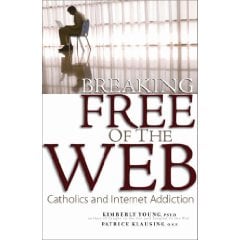 Okay, let’s say there really IS something out there called Internet addiction. What does one do about it? Recently an old pal, upon seeing that I went from 50 Facebook friends to 500 in only two months (yah!) sent me a book, “Breaking Free of the Web: Catholics and Internet Addiction” by Kimberly Young, Phy.D. and Patrice Klausing, O.S.F. I thought their advice was pretty good, for the most part, except for the confession stuff. Because, I’ve admitted this before, I’m just not real comfortable with that sacrament. I say we label it like Pluto, and bump it out of the solar system, I mean universe of Catholic sacraments. Here are their five steps for Catholics caught in destructive habits that involve lots of time in front of a computer monitor:
Okay, let’s say there really IS something out there called Internet addiction. What does one do about it? Recently an old pal, upon seeing that I went from 50 Facebook friends to 500 in only two months (yah!) sent me a book, “Breaking Free of the Web: Catholics and Internet Addiction” by Kimberly Young, Phy.D. and Patrice Klausing, O.S.F. I thought their advice was pretty good, for the most part, except for the confession stuff. Because, I’ve admitted this before, I’m just not real comfortable with that sacrament. I say we label it like Pluto, and bump it out of the solar system, I mean universe of Catholic sacraments. Here are their five steps for Catholics caught in destructive habits that involve lots of time in front of a computer monitor:
Step one: Be open.
At some point, the person needs to wake up to his behavior, and realize that time once spent on supervising homework with the kids is now squandered on surfing the net and reviewing the updates of Facebook “friends.” Like any addiction, nothing will get resolved if a person stays in denial. He must admit the problem before recovery takes place.
Step two: Seek professional help.
Writes Young and Klausing: “It isn’t easy to find a therapist familiar with the Internet, online addiction and the impact of online affairs. Over time this will change, but in the meantime, make sure that your therapist is someone willing to listen and learn about the Internet in order to best help you.”
Step three: Practice the twelve steps.
The twelve steps were written for persons recovering from alcoholism, but they work for any addiction. I like to summarize the first three in this simple language: I can’t. God can. I think I’ll let him. Young and Klausing encourage those addicted to the Internet to join a support group of folks who are battling the same behavior. According to them, “this is especially important for Internet addicts who typically suffer from interpersonal difficulties such as introversion, a limited social network and poor social skills.”
Step four: Celebrate the sacrament of Reconciliation.
The authors explain how this sacrament can be a powerful and energizing force in changing behavior. By preparing and participating in this sacrament, a person begins the process of “establishing a right relationship with God.”
Step five: Have faith along the journey.
Young and Klausing rightly conclude that “the most challenging aspect of lasting recovery is fighting the temptation to return to the addiction,” which is why it’s so important to remember that God is with you–especially in those moments that fighting the beast of Internet addiction is hardest.
To read more Beyond Blue, go to http://blog.beliefnet.com/beyondblue, and to get to Group Beyond Blue, a support group at Beliefnet Community, click here.
To subscribe to “Beyond Blue” click here.
![]()

